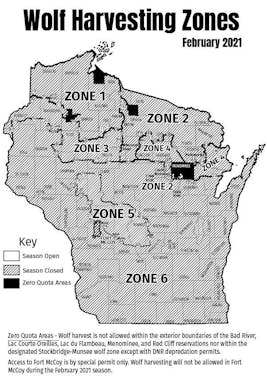As of Thursday, 216 wolves had been killed in just three days by non-tribal members in Wisconsin’s 2021 season, surpassing the quota of 119 set by the Department of Natural Resources.
The quota was originally approved at 200 in a special meeting of the Natural Resources Board on Feb. 15th. However, a declaration by Ojibwe bands in northern Wisconsin claimed their treaty rights to 50 percent of the harvest in ceded territory, forcing the DNR to reduce the quota to 119 for non-tribal members to account for a potential tribal hunt.
The DNR sold 27,151 wolf harvest applications, but 2,380 — twenty times the quota of 119 — were chosen randomly to receive permits.
“We continue to believe that a transparent and inclusive process, implemented over several months instead of a few days, produces the best season results for all interested parties,” Keith Warnke, Division Administrator of the DNR Fish, Wildlife & Parks Division said at a press briefing Thursday. “Although the time frame for doing so was short, we used the best available science while following existing laws to implement the season.”
A court ruling led the board to quickly move forward with a wolf hunt. The DNR appealed the ruling but their request was denied. Native Americans and wildlife experts stood in opposition to a rushed wolf hunting season in the state.
Hunters and trappers had 24 hours after a kill to register it, which led to all harvest zones exceeding their quota. While the hunt closed on Wednesday at 3:00 p.m. as reported kills exceeded the quota, hunters and trappers still had until Thursday to report kills.

Eighty-six percent of kills were taken by use of dogs, 5% by trappers and 9% by other hunting methods.
Previous seasons in 2013 and 2014 had quotas of 257 and 154 respectively, but it took approximately two months to fulfill these quotas.
On Tuesday, the DNR announced the closing of the first three zones at 10 a.m., followed by the closure of the remaining three zones at 3 p.m.. Zones officially closed 24 hours after the initial announcement.
Hunters exceeded quotas in each of the six zones and killed more than double the allotment in two of the zones.
“We monitored reported harvests constantly. The decision to close zones was made using the best available harvest data,” Warnke concluded.
The DNR does not yet have data on tribal harvests.






